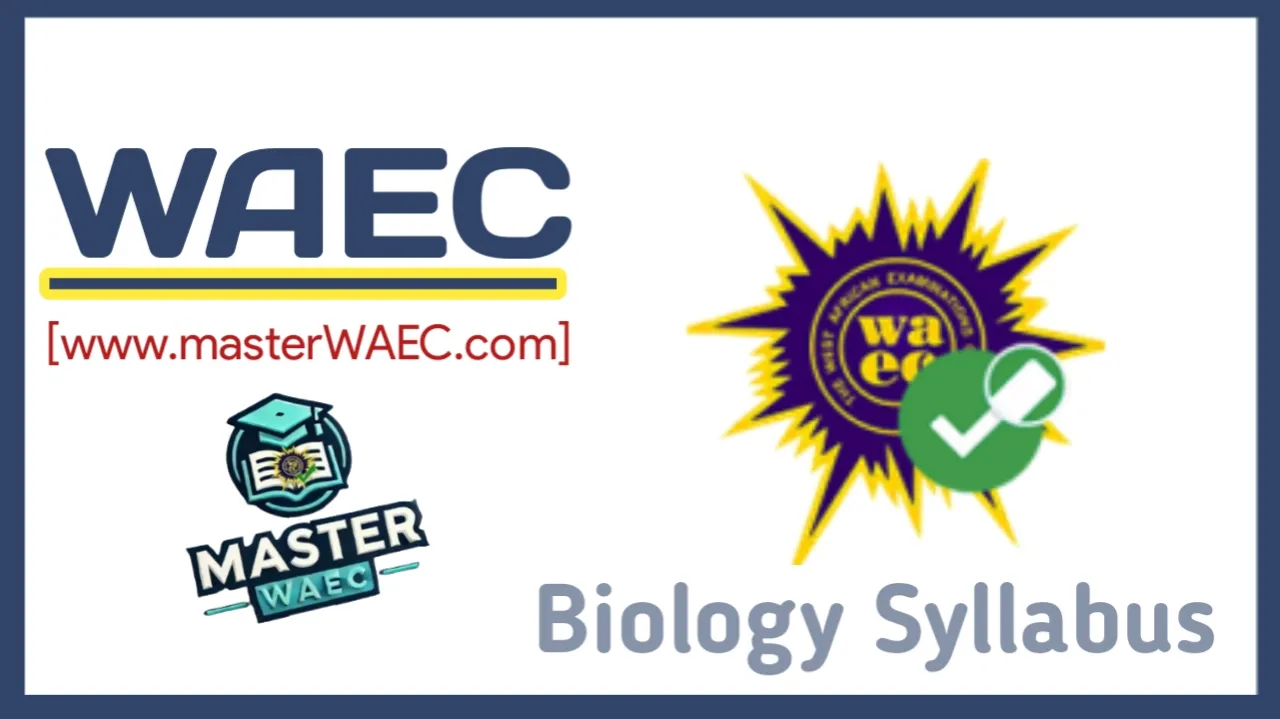The WAEC Syllabus for Biology 2026 is a guide that helps students understand what they need to study for the upcoming WAEC exams. It covers all the topics, practicals, and questions that might appear in the exam. Think of it as a roadmap that shows you exactly what to focus on so you can prepare with confidence.
Having a clear understanding of the syllabus is very important. It ensures you don’t waste time studying things that won’t be in the exam. The syllabus also gives you an idea of how the exam will be structured, including the practicals and essay questions.
To make your preparation even easier, we have provided the WAEC Syllabus for Biology 2026 PDF for download. This way, you can access it anytime and use it to plan your studies effectively. Get ready to take the first step towards success in your WAEC Biology exam!
Structure of the WAEC Biology 2026 Exam
Understanding the structure of the WAEC Biology 2026 exam is key to performing well. The exam is divided into three main papers, each testing different skills and areas of the syllabus. Here’s a simple breakdown:
1. Paper 1: Objective Questions
- This paper consists of 50 objective questions.
- Each question carries 1 mark, making a total of 50 marks.
- You will have 50 minutes to answer all the questions.
The questions are based on topics from Section A of the syllabus, which is common to all candidates.
2. Paper 2: Essay and Structured Questions
- This paper has six essay questions covering all sections of the syllabus.
- You will need to answer Two questions from Section A (general topics for all candidates).
- All questions from either: Section B (for candidates in Ghana), Section C (for candidates in Nigeria, Sierra Leone, The Gambia, and Liberia).
- Each question in Section A carries 20 marks, while questions in Sections B and C carry 30 marks.
- The paper is worth a total of 70 marks and lasts 1 hour 40 minutes.
3. Paper 3: Practical
- This paper focuses on practical skills and experiments.
- It includes three sections: Section A: Two compulsory questions for all candidates (each worth 25 marks)
- Section B: One question for Ghanaian candidates (30 marks).
- Section C: One question for candidates in Nigeria, Sierra Leone, The Gambia, and Liberia (30 marks).
- The practical exam is worth 80 marks and lasts 2 hours.
By understanding this structure, you can allocate your study time wisely and prepare for each paper effectively. This will help you feel more confident and ready to excel in your WAEC Biology 2026 exam!
Detailed WAEC Syllabus for Biology 2026
The WAEC Biology syllabus is divided into sections that cover a wide range of topics. These sections help students focus on what to study and prepare for the exam. Let’s start with Section A, which applies to all candidates.
A. Section A: General Topics for All Candidates
1. Concept of Living
This topic introduces the basics of life and the characteristics of living things.
- Classification of Living and Non Living Things: Learn how to identify and group living and non living things, with examples for each category.
- Differences Between Plants and Animals: Understand the key differences, such as movement, nutrition, and structure.
2. Organization of Life
Here, you will explore how life is organized, from the smallest unit to the largest systems.
- Cell, Tissue, Organ, and Organ Systems: Study the hierarchy of biological organization, starting from single cells to complex organ systems in plants and animals.
- Forms of Living Cells: Understand the different forms cells can take, including:
- Single: Independent organisms like Amoeba.
- Colony: Groups of cells working together, such as Volvox.
- Filament: Long chains of cells, like Spirogyra.
3. Cell Biology
This topic dives into the building blocks of all living things.
- Structure of Cells and Functions of Organelles: Learn about cell components such as the nucleus, mitochondria, and chloroplasts, and their roles.
- Differences Between Plant and Animal Cells: Understand the unique features of plant cells (like chloroplasts and cell walls) and how they differ from animal cells.
4. Processes of Life
This section explores the basic processes that keep living organisms alive and functioning.
- Diffusion, Osmosis, and Active Transport:
- Understand how substances move in and out of cells.
- Diffusion is the movement of particles from a high to a low concentration.
- Osmosis focuses on the movement of water through a semi-permeable membrane.
- Active transport requires energy to move substances against a concentration gradient.
- Nutrition: Learn how organisms obtain and use food for energy.
- Autotrophic Nutrition: Photosynthesis in plants.
- Heterotrophic Nutrition: Feeding methods like herbivory and carnivory.
- Cellular Respiration: The process of releasing energy from food, including aerobic and anaerobic respiration.
- Growth, Reproduction, and Movement:
- Understand how organisms grow (cell division and enlargement).
- Reproduction includes asexual (e.g., budding) and sexual methods (gamete formation).
- Movement is achieved through structures like cilia, flagella, and muscles.
5. Transport Systems
This topic focuses on how substances are moved within plants and animals.
- Circulation in Animals: Study the structure and function of the heart, blood vessels (arteries, veins, capillaries), and blood components (red and white blood cells, platelets, and plasma).
- Transport in Plants: Water Uptake: How roots absorb water from the soil.
- Transpiration: Loss of water vapor from plant surfaces.
- Translocation: Movement of nutrients, such as sugars, through the phloem.
6. Respiratory and Excretory Systems
These systems are essential for maintaining balance and removing waste in organisms.
- Mechanisms of Gaseous Exchange: How oxygen and carbon dioxide are exchanged in plants (stomata) and animals (lungs, gills).
- Excretion: Animals excrete waste like urea, water, and carbon dioxide through organs like kidneys and lungs.
- Plants remove excess water, oxygen, and carbon dioxide.
7. Ecology and Environmental Management
This section looks at how living and non-living components of the environment interact.
- Ecosystem Components: Biotic: Living organisms (producers, consumers, decomposers), Abiotic: Non-living elements like soil, water, and air.
- Food Chains, Food Webs, and Energy Flow
- Study how energy moves through ecosystems, starting from producers to various levels of consumers.
- Pollution and Conservation: Learn about environmental issues such as air and water pollution.
- Understand conservation methods to protect natural resources and maintain balance in ecosystems.
B. Section B: Topics for Ghana
This section is tailored specifically for candidates in Ghana. It focuses on unique biological concepts, genetics, and practical topics that provide deeper insights into biology.
1. Biological Concepts
This topic introduces basic biological ideas that help students understand the structure and orientation of organisms.
Body Symmetry and Orientation:
- Learn about different types of symmetry in animals, such as radial symmetry (e.g., starfish) and bilateral symmetry (e.g., humans).
- Understand how the body structure of organisms relates to their function and movement.
Biological Drawings and Diagrams:
- Master the skill of drawing labeled diagrams of biological specimens.
- Focus on clarity, proportion, and accuracy in diagrams like the structure of a cell or parts of a leaf.
2. Genetics and Heredity
This topic delves into the principles of inheritance and the molecular basis of life.
DNA Structure and Replication:
- Understand the double helix structure of DNA and its role in storing genetic information.
- Learn how DNA replicates to ensure genetic continuity during cell division.
Mendel’s Experiments and Mendelian Laws:
- Study Gregor Mendel’s experiments with pea plants.
Learn the Laws of Inheritance:
- Law of Segregation.
- Law of Independent Assortment.
Apply these laws to solve simple genetic problems, such as dominant and recessive traits.
3. Practical Topics
Practical work is essential for understanding and applying biological concepts.
Study of Amoeba, Paramecium, and Euglena:
- Observe the structure, movement, and feeding habits of these microorganisms under a microscope.
- Learn about their adaptations to different environments.
External Features of Mosses and Ferns:
- Identify and describe the physical characteristics of mosses and ferns.
- Understand their reproductive systems and role in the environment, such as moisture retention and soil formation.
These topics are designed to build a strong foundation in biology while developing practical skills. By focusing on these areas, Ghanaian students can gain a deeper understanding of biological concepts and perform better in their exams.
C. Section C: Topics for Nigeria, Sierra Leone, The Gambia, and Liberia
This section includes specialized topics that are important for students in these regions. It covers advanced ecology, health, nutrition, reproduction, and evolution, providing a comprehensive understanding of biology.
1. Advanced Ecology
This topic explores the interaction between organisms and their environment, as well as the processes that sustain life.
Nitrogen and Carbon Cycles:
- Learn how nitrogen moves through the soil, plants, and animals in ecosystems.
- Understand the carbon cycle and its importance in maintaining balance in the environment.
Aquatic and Terrestrial Habitats:
- Study the adaptations of plants and animals to life in water and on land.
- Examples include gills in fish for breathing underwater and thick bark in desert plants to conserve water.
2. Health and Diseases
This topic focuses on maintaining good health and understanding the effects of diseases.
Public Health:
- Learn about the importance of immunization and vaccination in preventing diseases.
- Basic first aid techniques for common injuries and emergencies.
Microorganisms:
- Explore the beneficial effects of microorganisms, such as fermentation and decomposition.
- Study harmful microorganisms that cause diseases like malaria, tuberculosis, and cholera.
3. Plant and Animal Nutrition
Nutrition is vital for the growth and survival of living organisms.
Photosynthesis:
- Understand the process by which plants make their food using sunlight, carbon dioxide, and water.
- Study the light and dark reactions involved in photosynthesis.
Balanced Diet and Food Tests:
- Learn the components of a balanced diet and their importance for health.
- Conduct tests for nutrients like starch, sugar, protein, and fats.
Digestion in Humans and Animals:
- Study the digestive systems of humans and selected animals, including the role of enzymes in breaking down food.
4. Reproduction
This topic explains how living organisms produce offspring.
Sexual and Asexual Reproduction:
- Learn the differences between these two types of reproduction.
- Examples include binary fission in bacteria (asexual) and flowering in plants (sexual).
Structure and Function of Male and Female Reproductive Systems:
- Understand the anatomy of reproductive organs in humans and their roles in reproduction.
5. Evolution and Genetics
This topic explores the origins of life and the inheritance of traits.
Evidence and Theories of Evolution:
- Study fossils, homologous structures, and other evidence supporting the theory of evolution.
- Learn about Darwin’s theory of natural selection.
- Linkage, Sex Determination, and Sex-Linked Traits:
- Understand how traits are inherited through chromosomes.
- Learn about genetic linkage, how sex is determined in humans, and examples of sex-linked traits like color blindness.
By mastering these topics, students in Nigeria, Sierra Leone, The Gambia, and Liberia will be well prepared for their WAEC Biology 2025 exam. These areas not only cover theoretical knowledge but also build a deeper understanding of biology in practical and real life contexts.
Areas of concentration for WAEC Biology 2026
To excel in WAEC Biology 2026 exam, it’s important to focus on the areas/topics that are frequently covered in previous exams. These areas of concentration are critical for both theory and practical questions and are often emphasized in the syllabus.
Below are the areas of concentration in waec biology 2026 to prioritize:
- Classification
- Organization of life
- Forms in which living cells exist
- Cell structure and functions of cell components
- The Cell and its environment: Physical and Biophysical processes
- Excretory Systems and Mechanisms
- Regulation of Internal Environment (Homeostasis)
- Hormonal Coordination
- Nervous Coordination
- Sense Organs: Eye and Ear
- Reproductive systems in mammals, insects, and flowering plants
- Properties and functions of the living cell
- Tissues and supporting systems
- Transport System
- Respiratory System
WAEC Syllabus for Biology 2026 PDF Download
RELATED POST:
WAEC Syllabus for Physics 2026: Proven Rodmap to A1
WAEC Syllabus For Mathematics 2026
Best Site for WAEC Expo 2026 Questions And Answers/Runz
Benefits of Downloading the WAEC Syllabus for Biology 2026 PDF
Downloading the WAEC syllabus for biology PDF is one of the smartest steps you can take to prepare effectively for the 2026 WAEC exams. Here is why it’s so important:
1. Provides a Complete List of Topics for Study
The syllabus gives you a clear outline of all the topics you need to study for your WAEC Biology exam.
It ensures you know exactly what is expected, including theory, practicals, and key focus areas.
With the PDF, you can refer back to the list anytime to track your progress.
2. Helps Students Stay Organized and Focused
Having the syllabus at your fingertips makes it easier to plan your studies.
You can break down your study schedule topic by topic, ensuring that you cover everything before the exam.
It helps you avoid wasting time on irrelevant materials that won’t be tested.
3. Ensures No Important Topic is Missed
Without the syllabus, it’s easy to overlook crucial topics that might appear in the exam.
The PDF acts as a checklist to confirm that you’ve studied all the necessary areas.
This reduces anxiety and gives you confidence that you are fully prepared.
By downloading the WAEC Biology syllabus PDF, you’ll have a reliable guide to keep you on track and boost your chances of success. Make sure to grab your copy today and start preparing with confidence!
If you have any question related to waec biology 2026 exam, feel free to drop a comment below. MasterWAEC.com is ready to assist you always.

Kolade Kayode, known as Mr. KK, I am a Nigerian education blogger and founder of MasterWAEC.com. Passionate about student success, I simplifies WAEC exam preparation with accurate tips and resources to help students excel.


Good